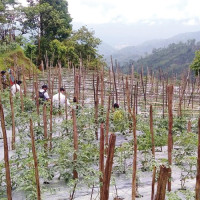- Monday, 23 February 2026
50,000 goats, 3,000 buffaloes will be offered for Goddess in Kathmandu during Dashain
By A Staff Reporter,Kathmandu, Oct. 11: Thousands of he-goats, buffaloes, pigeons and ducks are to be offered to appease Goddess Durga and supply meat for the extended feasting during the Dashain festival in the Kathmandu Valley.
According to the Department of Livestock Services, about 50,000 goats, including mountain goats, 3,000 buffaloes and a large number of chickens and ducks will be sacrificed for meat in the Valley during Dashain.
Likewise, around 8,000-10,000 ducks, 700-1,000 pigs and 60,000 tonnes of fish are consumed in the Kathmandu Valley alone.
However, there is no official statistics of the total number of animals and chicken that are sacrificed during Dashain festival in the Kathmandu Valley.
According to the statistics of the Department, around 42,000 goats, including sheep, mountain goats, entered in the Kathmandu Valley last year's Dashain. Similarly, 3,000 buffaloes had entered in the Kathmandu Valley last year's Dashain.
Senior Veterinarian of the Department of Livestock Services Dr. Rajesh Yadav said that around 33,000 goats have already entered in the Kathmandu Valley from various places of the district by Thursday.
"Daily above 5,000 goats have been entering the Kathmandu Valley since Sunday. Due to the damaged roads in various places caused by heavy rains it has become difficult to bring goats from various places inside the Valley," he said.
Traders are now selling goats in the main markets of the Valley like Kalanki, Thankot, Tukucha, Balaju and Sallaghari, Bhaktapur, among others.
He, however, said that there will be no shortage of goats in the market as the flow of goats by the traders is gradually going up after the reoperation of damaged roads.
The sales of goats will be high on Phulpati and Astami as compared to other days in the Valley, he said.
For the past few years, the traders are supplying goats and mountain goats to the Kathmandu Valley from various parts of the country after tightened quarantine in Nepal-India border, he said.
"In the past, the traders used to import goats from India due to difficulty in collecting goats from the villages of Nepal. After the government tightened quarantine since 2022/23, they were forced to collect the goats from various parts of the country and it has helped the farmers to sell their produce easily," he said.
The government has claimed that Nepal’s domestic market is almost capable to meet the local demand of livestock at present while the people had to rely on imports from Tibet and India to meet their meat demands until a few years ago.
The government had already declared that the country had become self-reliant in meat and meat-related goods.
According to the Department, around 4.5 million to 5 million goats are used for meat items every year. Out of this, above 55 per cent get consumed during the Dashain and Tihar festivals. The total population of goats in Nepal is estimated at 14 million.
No goats imported in first two months of FY 2024/25
The import of goats has decreased significantly over the last few years due to the improvement in the supply along with local production and tightened quarantine check.
Only 995 goats and 16 sheep entered Nepal from abroad in the last fiscal year 2023/24. However, there were no goats imported in the first two months of the current fiscal year.
Similarly, no goats were imported in the previous fiscal year 2022/23.
Only around 50,700 goats entered Nepal from abroad in the fiscal year 2021/22 while 445,236 goats had been imported in 2017/18.
Similarly, around 316,000 goats were imported in fiscal year 2018/19 and 10,292 goats in the fiscal year 2019/20 and 13,827 goats in the fiscal year 2020/21. In the fiscal year 2010/11, the country had imported 370,459 goats and 29,167 sheep.
Likewise, 1,181,428 goats had been imported in the fiscal year 2011/12, 465,322 goats in the fiscal year 2012/13, 434,866 goats in 2013/14, 384,780 goats in fiscal year 2014/15, 479,207 goats in the fiscal year 2015/16 and 327,897 goats in 2016/17.





-square-thumb.jpg)










